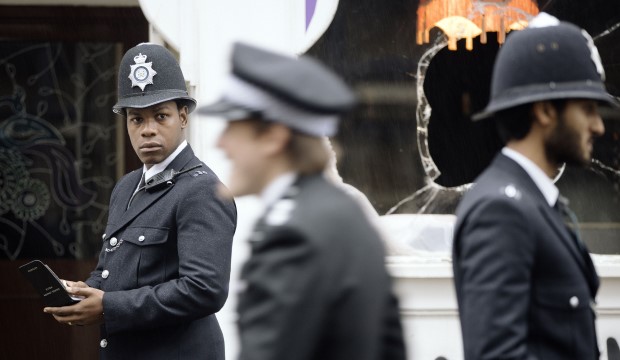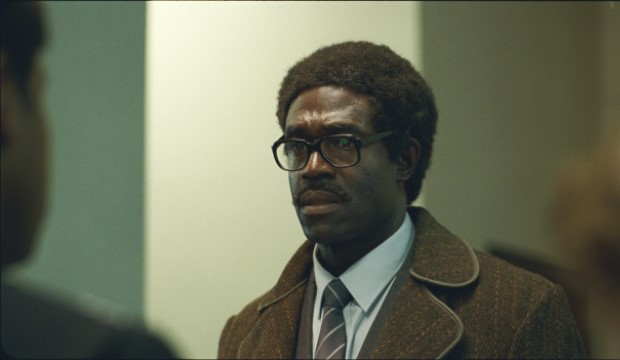Small Axe: Red, White and Blue review ★★★★★
In the third Small Axe film from Steve McQueen, John Boyega stars as Leroy Logan, a black officer in the 80s who wanted to eliminate racism in the police
John Boyega in Small Axe: Red, White and Blue, BBC One (Photo: BBC)
What
a year for John Boyega. After being released from Star Wars, he made headlines for delivering a spirit-shaking speech at the BLM
protests in Hyde Park on 3 June. And then, he gave an incisive interview with British
GQ about his mental struggles as an actor and a person of colour – gaining even greater respect around the world.
Red, White and Blue, the third in Steve McQueen’s cinematic quintet Small Axe, exemplifies the exciting new direction of Boyega's career – away from starships and lightsabres. Here he plays Leroy Logan, a black Met police officer in the 80s who wanted to change systemic racism from the inside.

John Boyega plays 80s Met police officer Leroy Logan. Photo: BBC
On the face of it, Leroy is the classic, intelligent fish out of water. He leaves his insular job in forensic science to be a bobby on the beat, shortly after his defiant and patriarchal father is assaulted by the police. He finds, of course, that the practical experience, on patrol with white officers, is more gruelling and upsetting than academic education can comprehend. Innocence thrown in at the deep end.
But McQueen and co-writer Courttia Newland, who also worked on Lovers Rock, produce a film more emotionally complicated than that. For one thing, Leroy isn’t naive. The film opens as young Leroy waits alone by the school gates. Two white officers stop and search him. His father, furiously played by Steve Toussaint, comes to his rescue and teaches him not to bow to prejudicial authority – especially not those in uniform.
Leroy’s somewhat ironic application to join the police causes alienation from all sides. Not only from racist colleagues, but those in his own community who see him as a traitor.
This racial isolation, attacked by both friends and enemies, has a BlackKklansman quality – only much, much harsher. (The debate of defunding the police still rages on, being a key BLM motive.) As Leroy begins working for the Greater London police, you realise the overwhelming hopelessness in trying to reform this system.
He wants to help the community he’s charged with protecting, which means empathy and understanding, concepts that his white colleagues don’t comprehend. Many of them take an England-for-the-English approach, even advising a Pakistani constable against speaking Urdu to Pakistani residents. These moments build and build in the latter half, before a horrendous piece of racist graffiti is scrawled on Leroy’s locker.

Steve Toussaint plays Leroy's defiant and patriarchal father. Photo: BBC
McQueen retains a crushing bluntness in these moments and, aside from a few 80s tracks played from radios and record players, there’s no music to sensationalise them. You shake and tense with such intense rage, watching the vitriolic disregard for the good he’s doing. Even the cynical stares and sighs cut deep.
This biopic only covers Leroy Logan’s early career, ending before you see his achievements in the police. McQueen even avoids the cliché of black-and-white photographs showing the real people, subtitled with what they did next.
Red, White and Blue concludes with the unknown: Leroy uncertain about whether his efforts will actually achieve anything. But the brave will to try – regardless of the pain and resistance, with no cinematically fateful result in sight – shows the worth of fighting for these issues. Although you’re offered many reasons to despair humanity, it's an inspiring and invigorating journey.
Small Axe: Red, White and Blue airs on Sunday 29 November at 9pm on BBC One
Red, White and Blue, the third in Steve McQueen’s cinematic quintet Small Axe, exemplifies the exciting new direction of Boyega's career – away from starships and lightsabres. Here he plays Leroy Logan, a black Met police officer in the 80s who wanted to change systemic racism from the inside.

John Boyega plays 80s Met police officer Leroy Logan. Photo: BBC
On the face of it, Leroy is the classic, intelligent fish out of water. He leaves his insular job in forensic science to be a bobby on the beat, shortly after his defiant and patriarchal father is assaulted by the police. He finds, of course, that the practical experience, on patrol with white officers, is more gruelling and upsetting than academic education can comprehend. Innocence thrown in at the deep end.
But McQueen and co-writer Courttia Newland, who also worked on Lovers Rock, produce a film more emotionally complicated than that. For one thing, Leroy isn’t naive. The film opens as young Leroy waits alone by the school gates. Two white officers stop and search him. His father, furiously played by Steve Toussaint, comes to his rescue and teaches him not to bow to prejudicial authority – especially not those in uniform.
Leroy’s somewhat ironic application to join the police causes alienation from all sides. Not only from racist colleagues, but those in his own community who see him as a traitor.
This racial isolation, attacked by both friends and enemies, has a BlackKklansman quality – only much, much harsher. (The debate of defunding the police still rages on, being a key BLM motive.) As Leroy begins working for the Greater London police, you realise the overwhelming hopelessness in trying to reform this system.
He wants to help the community he’s charged with protecting, which means empathy and understanding, concepts that his white colleagues don’t comprehend. Many of them take an England-for-the-English approach, even advising a Pakistani constable against speaking Urdu to Pakistani residents. These moments build and build in the latter half, before a horrendous piece of racist graffiti is scrawled on Leroy’s locker.

Steve Toussaint plays Leroy's defiant and patriarchal father. Photo: BBC
McQueen retains a crushing bluntness in these moments and, aside from a few 80s tracks played from radios and record players, there’s no music to sensationalise them. You shake and tense with such intense rage, watching the vitriolic disregard for the good he’s doing. Even the cynical stares and sighs cut deep.
This biopic only covers Leroy Logan’s early career, ending before you see his achievements in the police. McQueen even avoids the cliché of black-and-white photographs showing the real people, subtitled with what they did next.
Red, White and Blue concludes with the unknown: Leroy uncertain about whether his efforts will actually achieve anything. But the brave will to try – regardless of the pain and resistance, with no cinematically fateful result in sight – shows the worth of fighting for these issues. Although you’re offered many reasons to despair humanity, it's an inspiring and invigorating journey.
Small Axe: Red, White and Blue airs on Sunday 29 November at 9pm on BBC One
TRY CULTURE WHISPER
Receive free tickets & insider tips to unlock the best of London — direct to your inbox
| What | Small Axe: Red, White and Blue review |
| When |
29 Nov 20 – 29 Nov 21, ON BBC ONE |
| Price | £n/a |
| Website | Click here for more information |